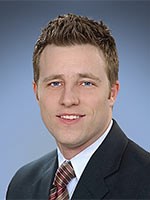Why your shoulder hurts and what you can do about the pain
January 8, 2019

Q & A with Michael Chiu, M.D.
Michael Chiu, M.D. is an orthopedic surgeon who specializes in arthroscopy, sports injuries and sports medicine. He regularly performs surgery at the NCH Day Surgery Center. He discusses some of the common injuries and problems related to the shoulder and the procedures and surgeries that help repair and restore its function.
What are some common shoulder injuries?
Injuries differ depending on age. In the pediatric or student athlete patient, some of the common shoulder problems or injuries involve dislocation of the shoulder or clavicle joints, shoulder joint tears, rotator cuff tendinitis and “little league shoulder,” an overuse injury caused by stress to the arm bone. I also see shoulder instability and clavicle fractures.
In younger adults, we see the same problems as the pediatric/student athlete population, but slightly less shoulder dislocations and instability involving the joint unless they are recurring from a younger age. I see an increased incidence of rotator cuff issues, including tendinitis. I also see fractures and overuse injuries.
Older adults tend to experience injuries that involve rotator cuff tears and fractures (with particular increase in fractures to the humerus), arthritis or advanced degenerative joint disease, starting around age 50. Shoulder dislocations are less commonly seen.
How do shoulder injuries occur?
Shoulder injuries can occur in many different ways including direct trauma, chronic overuse and injury due to fatigue or excessive amount of stress on the shoulder.
Is there any way to prevent or lessen the chance of a shoulder injury?
There are several ways, including supporting the muscular structures that stabilize the shoulder and rotator cuff, using proper body mechanics (one example might be how an athlete throws a ball overhead) and avoiding circumstances that place the shoulder at increased risk of injury.
What are the treatments for these injuries?
Oftentimes, pain and dysfunction can be minimized through non-operative means such as a heat and ice application, medicines, activity modification, rehabilitation exercises or physical therapy and sometimes injections. If these treatments fail to provide relief, surgical intervention may be recommended.
What types of shoulder surgeries do you perform?
I perform cutting edge and latest techniques in this area, having written book chapters to this end as well as teaching other orthopedic surgeons at national courses on these topics. Some of the more common surgeries I perform include arthroscopic surgery for labral repairs for shoulder instability, reconstruction of the shoulder or capsule, rotator cuff repairs, arthroscopic assisted and/or open shoulder surgery for fractures, repairs, shoulder reconstruction and cartilage restoration.
What can a patient expect before, during and after a procedure?
For outpatient shoulder surgery at the NCH Day Surgery Center, a patient will arrive prior to the scheduled surgery and then undergo evaluation and preparation in the preoperative area. Once the patient is ready for surgery, he or she will be taken to the operative suite.
Afterwards, a patient will wake up in the recovery unit under further monitoring to ensure progress towards a safe discharge home.
At the time of discharge, a patient will receive surgery specific instructions, medication and any information needed during the postoperative recovery process.
What can a patient expect from recovery during physical therapy?
Each surgery and postoperative rehabilitation plan will be tailored to the individual patient. Often in my practice, physical therapy is started within days of surgery in a controlled, supervised environment to ensure proper progression while maintaining postoperative precautions to allow for healing. This is done to facilitate early mobilization, when appropriate, and a faster recovery.
How long is the average recovery plan?
Some of the more common shoulder surgery postoperative plans can include a three- to six-month recovery time with variations based in large part on the shoulder condition being treated surgically, desired patient activity level, work/employment conditions or athletic requirements.
How do sports medicine and orthopedic surgery complement one another?
A branch of orthopedic surgery includes sports medicine. Although there are other medical specialties that can facilitate care of athletes with specialized sports medicine training – such as family medicine, physical medicine and rehabilitation or emergency medicine – only orthopedic surgery encompasses the entire gamut of care, which includes non-surgical management with the addition of surgical intervention, when needed. In this way, orthopedics and sports medicine go hand in hand with thorough understanding of anatomy, physiology, as well as biomechanics.
For more information or to schedule an appointment with Dr. Chiu, call 847-870-6100.
Take a virtual tour of our Day Surgery Center.